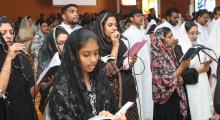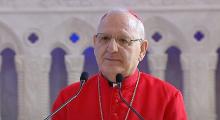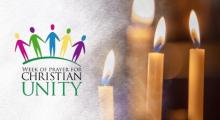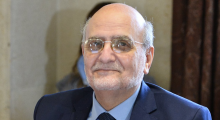Issued by the Catholic Center for Studies and Media - Jordan. Editor-in-chief Fr. Rif'at Bader - موقع أبونا abouna.org
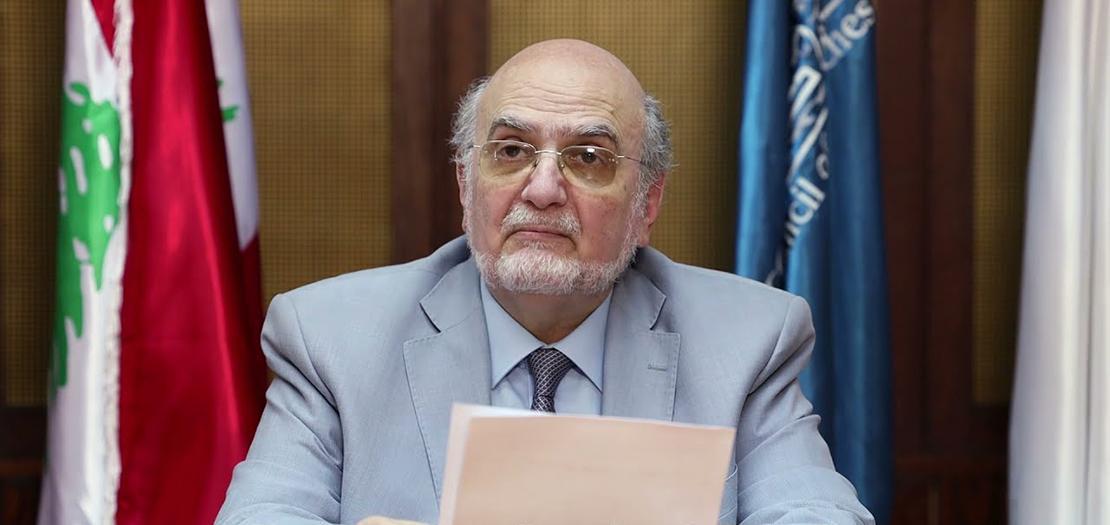
On the first commemoration of the Beirut Port devastating blast, the Middle East Council of Churches Secretary General Dr. Michel Abs addressed a message that was published in a special issue of “Al Muntada” magazine, issued by the MECC Communication and Public Relations Department. Hence, Dr. Abs presented what Lebanese people passed through since August 4, 2020, in addition to the latest updates of their living circumstances today. He also described the various human aspects that shook the world, as well as its consequences.
Another chapter of the epic tragedy of our Antiochene Levant was drilled a year ago in Beirut.
I say drilled and not written, because what happened has been etched in our bodies as well as in our memory, and likewise in the memory of those who would care for us.
The march of flesh and blood and homelessness has not ended its chapters as yet!
More than two hundred dead, six thousand wounded and hundreds of thousands of homeless people were a blow to humanity, to the whole world, to the extension of the Arab World as well as to the whole of humanity itself.
Moreover, the horror of the tragedy raised crucial questions not only to Lebanon but also to the eastern hemisphere and to the Arab world in its entirety.
Where are the limits of the safety of our people, and who and what guarantees this safety?
To be sitting at home with your family, or in your office, and suddenly find yourself dumped somewhere, covered with blood or dead, or to see the harvest of your life evaporated, this is something that you only find in the glossary of the jungle.
The Lebanese who lived through the tragedy can tell thousands of stories about what happened during those few seconds when, in no time, the dragon killed Beirut.
Beirut neither provided a safe haven for all the poems that were written for her, nor for all the courting that she had witnessed, as the dragon does not understand the language of love and beauty.
What happened, how did it happen, and why did it happen?
Nobody knows until today.
Don't people have the right to know why they were deprived of the ones most precious to their hearts, of those whom they would have readily ransomed with their own lives, and why they ended up without roof and without work?
Is what happened to Beirut a conspiracy?
Nothing indicates, in all the stages reported by the media about how these dangerous commodities arrived in Beirut and remained in it for years, nor why no how what happened was without a doubt planned in dark rooms and by dark souls. Without any doubt the biggest part of the "conspiracy" lies in our own neglect and in our lack of responsibility as well as for the absence of the feeling of accountability in our culture.
The bitterness of the Beirut Port disaster is only matched by the disappointment of the Lebanese in the attempt to build a capable and just state.
Whether the explosion was the result of long-term careful planning, or the result of an accident to a misfortunate people, the institutions managing public affairs are responsible towards God as well as to the people for what happened to the Lebanese.
In managing public affairs, perseverance is necessary in order to protect people and secure their interests. Procrastination, taking things lightly and letting time do whatever seems to be necessary to solve things as well as throwing the responsibility for decision making at each other are fatal. It is not by wishful thinking that things should be considered, but rather by determination.
“Neglecting” the issue of incendiary commodities, not paying attention to their danger, and not insisting on getting rid of them, is a pattern of behavior that characterizes most public affairs institutions, since people were not raised to care for the interest of the public, nor did they acquire the culture and necessary values essential to maintaining public affairs.
No one can be certain whether the "negligence" that led to the catastrophe is the result of indifference that comes as a natural trait to those who have taken up public affairs, or whether it is the result of complicity in order to reach the disaster. Only the judicial investigation will decide in the matter.
But the problem that fueled the fire of bereavement lies in the obstacles that the judicial investigation has faced to get to results, a thing that made reaching results extend for a whole year whereas the people were promised that results will appear within four days.
Rumors and interpretations abounded, accompanied by rumors about the progress of the investigation, especially when the judicial investigator was changed and when politics overlapped with truth. We all know that politics and justice are on opposite ends of the scale. Politics is the art of the possible, as some call it, while in justice the issue is either right or wrong.
Those who promote a culture of compromise and half-truths have forgotten that the field of politics is really the art of that which is possible, however it is more sow the art of serving national issues. Political settlements cannot be made at the expense of the nation's interests and destiny.
Here, we must place the explosion of this day and age in the port of Beirut in the context of what Lebanon has been experiencing for the last two years, which is the result of three decades of accumulating mismanagement and bad credit that rises to the "rank" of treason.
The incident came after a massive popular uprising that demanded radical changes in the management of public affairs, in addition to Lebanon's plunging into the quagmire of the pandemic that is invading the world. Lebanon has become caught between two hammers and one anvil: one is the hammer of the pandemic, which exhausts the energies of an exhausted society and economy, and two the hammer of the explosion, which ranks among the highest levels of destructive action in the world. The anvil is the corrupt political system and flabby corrupted administrative practices.
The people of Lebanon, similar to many of the peoples of the region affected by disasters, have proven that they are a solid people who at the same time do not lack flexibility, able to continue their lives despite obstacles, wounds and calamities. They are a tolerant people too, endowed with more than tolerance is necessary at times.
The people are waiting, they are demanding, and they are moving towards a heart-warming yearning of the investigation and a warning to those who were the cause of the crowning of their tragedies, the wrecking of their capital.
Today, the economic conditions are deteriorating very fast and at a dangerous speed, and furthermore the quality of life and social structures are witnessing a disintegration not observed during the decade and a half war that devastated Lebanon in the last century.
Poverty, unemployment, crime, suicide, drug addiction, domestic violence, family disintegration, migration of all kinds of professional groups, closure of institutions, school dropout rate, in addition to other eventual disasters, are on a steady rise.
Moreover, this did not save the Lebanese from the evil of more adversity: the severe shortage to the point of interruption, in basic materials such as fuel, medicines and foodstuffs, all this leads the Lebanese to the edge of despair, despite their optimistic and life-loving nature.
The Beirut bombing, as well as the time when it occurred, marks the end of one era and the beginning of another. A transitional phase that may be long or short depending on the overlapping and interaction of the variables that are related to what has happened, but it is certain that regardless of what has happened, and whatever transformations will result from it, this would not affect Lebanon as an entity, nor Lebanon as a people, nor Lebanon as a culture.
Beirut will rise again, and with-it Lebanon and the destroyed Antiochian Levant as it is rooted in the victory of Saint George as its patron, the Green who killed the dragon, and should falsehood have a round, Truth has many more rounds and Truth is the victor with the resurrection of the Crucified Incarnate One.
Beirut will prove that killing a safe people is a matter not to be considered of!


